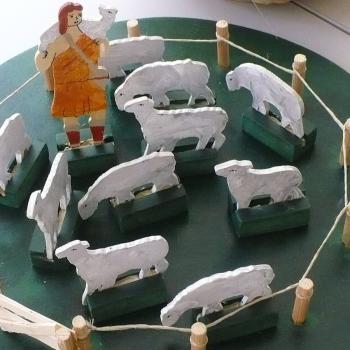A friend posed a question in a private forum, and I’d like to share my response. The original question was:
Innocent question from my 7-year-old after talking to the older kids about what’s going on with Planned Parenthood: “Why doesn’t the president stop them?” She can’t seem to wrap her mind around how this is legal.
Some thoughts before we begin:
Evil is going to find your children. It is neither necessary nor desirable to introduce evil to your children, enough of it will come to their attention whether you like it or not.
There is a time and place for shielding your children from cruel realities. When I volunteered in the pro-life movement when my eldest was very young, I gave my son a simple, honest, but vague explanation for the work: “We teach people not to hurt babies.”
But sooner or later your child is going to find out about slavery or the Holocaust or terrorism or some other evil thing. When that happens, there are things you can do to help your child make sense of the evil in the world, without going into lots of graphic explanations or dwelling on darkness.
These are topics for parents. We live in a fairy-tale world: A world where princesses get cursed and children thrown into ovens by witches in candy houses and wolves disguise themselves as grandmothers. You the parent are the best judge of your child’s readiness to discuss this or that topic, and in what detail. You the parent have the best instincts about how to explain a difficult topic in a way that will answer your child’s need for understanding without burdening your child with fear or anxiety or a sense of adult responsibility.
Thus if you find yourself teaching religious education and a student brings up a mature topic, do not presume to know the readiness of every child in the room. Let the student know that it’s a topic for Mom or Dad to explain; if you get an opportunity to speak to the parent, mention it came up so they know it’s on their child’s mind. Let your program director or pastor know it came up in class. Meanwhile, your job is to focus on general moral principles that apply at any age, but using G-rated examples only.
Now, on to my original answer.
How do you address the ugly reality that adults in authority are doing horrible things?
The answer is that you teach your children how to live the moral life.
This isn’t a single conversation, but a series of conversations, though you’ll no doubt find a few points helpful in answering the question of the moment. Particular points to make:
Everybody does things they shouldn’t. If your child is at or past the age of reason, this is a natural tie-in to Confession, mortal vs. venial sin, examining your own conscience, and so forth. With younger children, you can keep to a simple, “Sometimes you do things you know you shouldn’t do, don’t you?”
The mortal-vs.-venial distinction, even if you don’t put it in those words, is important, because swiping an extra cookie is most emphatically not the moral equivalent of approving the slaughter of innocents. Also, at all ages distinguish accidents, temptations, and sins, because the three are quite different. Knowing those differences is essential to a healthy moral life.
Often the sins that are the hardest to stop are the ones that people say are “no big deal” even though they are a big deal. Your child can probably think of examples in his or her own life.
Sometimes we sin when we’re trying to do something good, even though that’s not the right way to solve a problem. (Example: Lying to get out of trouble?) It can be hard to resist that temptation. In reality all sin is an effort to grasp at the good the sin promises, but in this case you’re focusing specifically on how people try to solve problems by doing evil.
To avoid dwelling on horrors and dashing the last shreds of your child’s innocence, you can discuss this concept by diverting to overblown silly examples. “What if I tried to clean the kitchen by blowing it up with dynamite so there’d be no more dirty dishes?” “What if I was cold, so I stole all the cats in the neighborhood and put them in my bed to keep me warm?”
Not everything adults do is right or good. This is a tricky topic, because you don’t want to destroy your child’s sense of trust, but at the same time, you do need for your child to have a clear understanding of the moral world. Explain that your job as the parent is to protect your children from evil until they are old enough to protect themselves.
It is your job as the adult to teach your children how to tell who is doing something good and who is doing something bad, so that when they are grown-ups, they can know whether the things other people are doing are right or wrong. Remind your child that you are available to listen and help any time there’s a question about whether something someone is doing is right or wrong.
Just because something is legal or common doesn’t mean it’s right. This is a huge teaching point with kids today because the reality is that your child is going to spend adulthood immersed in a culture that accepts all kinds of immoral practices as “good.”
Some people think that it’s okay to do something bad, even hurt other people, if it causes a greater good. This is wrong. Yes, even at seven (or younger) a child can learn the difference between consequentialism and parallel effect. Use lots of concrete examples from your child’s own life.
[For more on this topic, see the links below.]
–> In all this, you aren’t mostly focusing on abortion (or the Holocaust, or slavery, or whatever other horror your child might have heard about), but on the general principles of the moral life that yes, seven-year-olds are ready to learn and understand and apply in their own life. So this is a long series of conversations that starts now (or much younger) and continues indefinitely.
If you have this foundation, when an ugly reality like this comes up, a lot of times it suffices to simply say, “You know, sometimes people do things that are seriously wrong, even though they know it will hurt other people, don’t they?”
***
Follow-up: My friend who posed the question shared that she and her daughter brainstormed answers to the question, “What can I do about this?” Answers included praying, helping at the crisis pregnancy center, and so forth.
Ultimately you do need to go there. We all need to answer the question of what role we are called to play in the face of evil. The age at which your child is ready to face that evil is something only you and your child can discern together.
***
Related Links:
Do the Ends Justify the Means? My 101 on Double Effect and whether you may do evil that good come of it (no, you may not).
Double Effect, In the Bathtub Erin Arlinghaus continues the conversation.
Why Can’t We Do Evil that Good Might Come of It? Even to Save a Life? Further conversation on this topic, in response to a challenge from Erin.
The Trouble with Double Effect An older post at my previous blog, covering this topic, and opening up a can of worms at the bottom.
Siris: Double Effect Comments on that post from philosopher Brandon Watson, who knows his business, attempting to deal with the worms.
I Confess, Hero Movie Par Excellence Alfred Hitchcock shows you how it’s done, in glorious black and white.

Artwork by Robert Smirke [CC BY-SA 4.0], via Wikimedia Commons. Sarah Siddons as Lady Macbeth (Smirke, c. 1790-1810).
















